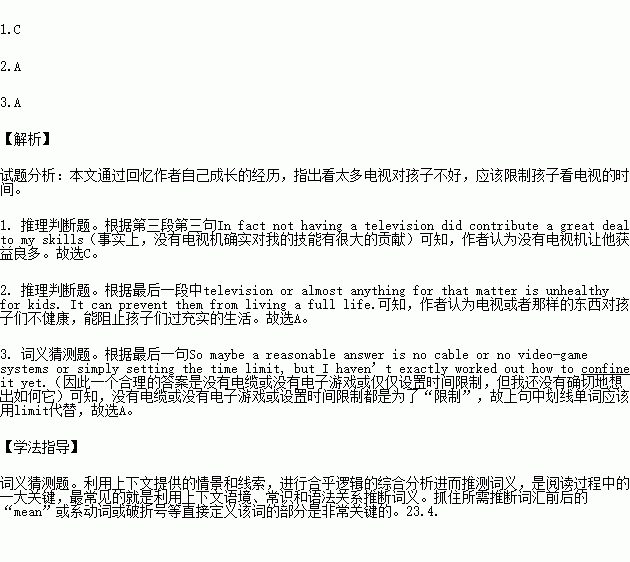题目内容
When I was a child, I had to go to church and obey many other rules, though these rules at times caused resentment (怨恨). Perhaps the most extreme parenting decision my parents made for my four brothers and sisters and me was to create a home environment without a television.
We hated this decision at that time, because there was seemingly no way to keep this embarrassing fact a secret at school. Naturally, simple pleasures like cartoons, football games, and movies became huge novelties (新奇事物). I would go over to friends’ or relatives’ houses for that access alone.
When I reached high school, my parents bought a television, though it had no cable. However, I did spend most of my childhood in a home without a television. In fact not having a television did contribute a great deal to my skills, and it also forced me to develop other valuable interests. We grew up in a small town, so my brothers and sisters and I spent time exploring streets, fields and woods. And of course I read and wrote and studied, which pushed me toward a career path.
So would I give a similar situation to my own children if I had them? I doubt it, at least not in the most extreme sense. I’m too much of a football fan, not to mention the TV serials (连续剧) like The Wire. But television or almost anything for that matter is unhealthy for kids. It can prevent them from living a full life. So maybe a reasonable answer is no cable or no video-game systems or simply setting the time limit, but I haven’t exactly worked out how to confine it yet. Although some people are against my idea, we do need limits after all.
1.From the text we can learn that ________.
A. the author didn’t like watching TV as a child
B. the author’s family seldom went to church
C. not having a TV set brought the author many benefits
D. few homes had a TV set when the author was a child
2.From the last paragraph we can learn the author thinks that ________.
A. children shouldn’t watch TV too much
B. children should be forbidden to watch TV
C. children should only watch serials and sports on TV
D. watching TV is unhealthy for both adults and children
3.Which of the following can replace the underlined word “confine” in the last paragraph?
A. Limit.B. Punish.C. Reject.D. Support.

